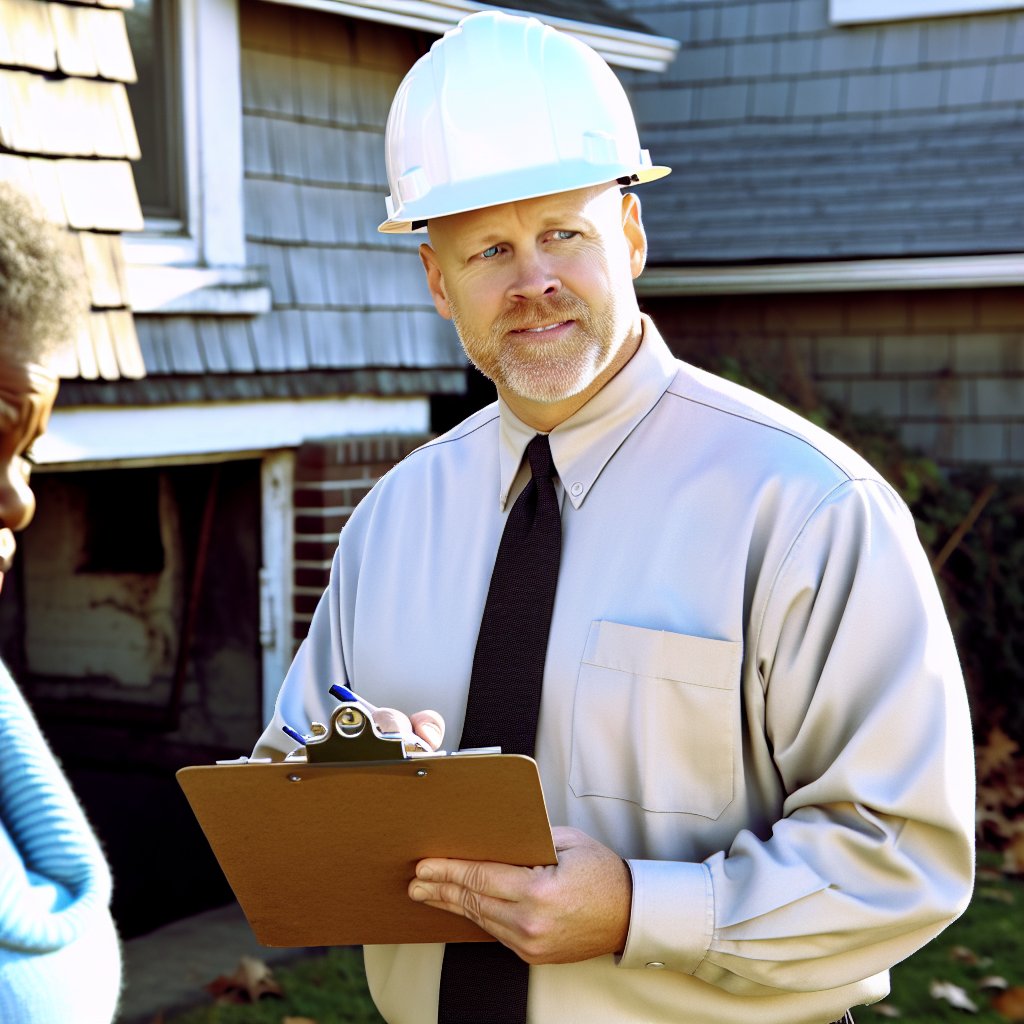Understanding the Importance of Property Inspections for Home Buyers
Property inspections empower home buyers to make informed choices.
They reveal critical information about a property’s condition.
Furthermore, they help buyers avoid unexpected repairs later.
This knowledge can significantly influence the buying process.
Identifying Hidden Issues
Inspections uncover hidden problems that are not readily visible.
For instance, they can detect structural defects or plumbing concerns.
Additionally, inspections may reveal safety hazards like mold or termites.
Negotiating Power
A thorough inspection report gives buyers a strong negotiating position.
Buyers can request repairs or price reductions based on findings.
Consequently, this can lead to significant financial savings.
Understanding the Process
The inspection process typically takes a few hours to complete.
Home buyers are encouraged to attend with their inspector.
This allows them to ask questions and understand the findings.
Choosing the Right Inspector
Selecting a qualified inspector is crucial for accurate assessments.
Buyers should look for licensed and experienced professionals.
Checking reviews and ratings can lead to better choices.
Benefits of Property Inspections
Ultimately, property inspections provide peace of mind.
They help buyers feel secure in their investment decisions.
As a result, investing in an inspection is always a wise choice.
Types of Property Inspections
General Home Inspection
A general home inspection assesses the overall condition of a property.
This type of inspection typically covers structural elements, roofing, and plumbing.
Home inspectors evaluate electrical systems and HVAC systems as well.
Ultimately, this inspection provides a comprehensive overview of a home’s condition.
Radon Testing
Radon testing determines the levels of radon gas within a home.
This gas is colorless and odorless, making it difficult to detect without testing.
Homebuyers should perform this test, especially in high-risk areas.
Reducing radon levels can significantly improve indoor air quality.
Pest Inspection
A pest inspection identifies potential infestations of termites or other pests.
Inspectors look for signs of damage caused by these pests.
This assessment helps homeowners avoid costly repairs in the future.
Additionally, it ensures that a home is safe from structural damage.
Roof Inspection
A roof inspection focuses on the condition of a home’s roofing system.
This inspection checks for missing shingles, leaks, and signs of wear.
Inspectors evaluate the roof’s lifespan and recommend any needed repairs.
Addressing roof issues early can prevent more significant problems later.
Electrical Inspection
An electrical inspection evaluates the safety and functionality of a home’s electrical system.
This assessment checks for outdated wiring, overloaded circuits, and code violations.
Ensuring the electrical system is safe protects against fire hazards.
Additionally, it offers peace of mind to homebuyers.
Plumbing Inspection
A plumbing inspection examines the pipes, fixtures, and appliances within a home.
This inspection identifies leaks, corrosion, and potential blockages.
It ensures the plumbing system operates efficiently and safely.
Addressing plumbing issues before closing can save time and money.
New Construction Inspection
A new construction inspection evaluates the quality of a recently built home.
Inspectors ensure the home meets local building codes and standards.
This inspection can highlight areas needing correction before final walkthroughs.
Moreover, it ensures that the final outcome matches the homeowner’s expectations.
Choosing the Right Inspector
Qualifications to Look For
Start by checking the inspector’s qualifications.
They should possess the necessary certifications.
Look for experience in residential home inspections.
Inquire about their background in construction or engineering.
Additionally, confirm their membership in professional associations.
Essential Credentials
Ensure the inspector holds a valid state license.
Review any relevant certifications from recognized organizations.
Ask for proof of ongoing education in the field.
Inspectors should be up-to-date on local building codes.
Experience Matters
Prioritize choosing an inspector with several years of experience.
Inquire about the number of homes they have inspected.
Request information about the types of properties they specialize in.
Experience with similar homes can lead to a thorough inspection.
Reviews and References
Look for online reviews from previous clients.
Check references provided by the inspector.
Positive feedback indicates reliability and thoroughness.
Ask for contact information of past clients for firsthand accounts.
Sample Inspection Reports
Request samples of past inspection reports.
These reports should be easy to understand and detailed.
A comprehensive report highlights key issues and necessary repairs.
Cost Considerations
Cost is an important factor when choosing an inspector.
Seek inspectors who provide transparent pricing structures.
Request multiple quotes to compare services offered.
Beware of inspectors who offer significantly lower prices.
They may cut corners in the inspection process.
Delve into the Subject: Lease Agreements for Rent-Controlled Units
The Inspection Process: What Happens During a Property Inspection
Initial Preparation
Homebuyers should schedule property inspections early in the buying process.
This step ensures they have time to address any issues.
Additionally, buyers must choose a qualified inspector.
Researching and reading reviews helps narrow down options.
Home Inspection Day
On inspection day, the inspector arrives on-site at the scheduled time.
The inspector typically introduces themselves and explains the process.
It is vital for buyers to be present during the inspection.
This allows them to ask questions and observe findings firsthand.
Exterior Inspection
The inspection begins with a thorough examination of the exterior.
Inspectors check the foundation for cracks or signs of damage.
Moreover, they look at the roof for missing shingles or leaks.
Other aspects include siding, windows, and walkways.
Each component contributes to the home’s overall integrity.
Interior Inspection
Next, the inspector moves inside the property.
They assess all rooms, focusing on walls, ceilings, and floors.
The plumbing system is also inspected for leaks or malfunctions.
Electrical systems are evaluated to ensure safety and compliance.
Also, heating, ventilation, and air conditioning systems are checked.
Documentation of Findings
After completing the inspection, the inspector compiles their findings.
This includes detailed notes and photographs of issues discovered.
Typically, the inspector generates a written report for the buyer.
It is crucial for buyers to review this report carefully.
The report informs their decision-making process regarding the property.
Follow-Up Actions
Based on the inspection report, buyers may proceed in several ways.
They can negotiate repairs with the seller before finalizing the purchase.
Alternatively, buyers might ask for concessions on the sale price.
In some cases, they may choose to walk away from the deal entirely.
Thus, the inspection process plays a vital role in home buying.
Explore Further: Property Tax Laws and Exemptions for Rental Owners
Common Issues Found During Inspections and Their Implications
Structural Problems
Structural issues often indicate serious underlying problems.
For example, foundation cracks can lead to significant repair costs.
Homebuyers should pay close attention to any visible damage in walls or ceilings.
Additionally, misalignment of doors and windows may suggest structural instability.
Electrical System Concerns
Outdated electrical systems pose safety and compliance risks.
Buyers should look for flickering lights as a warning sign.
Moreover, faulty wiring can lead to electrical fires.
Consulting a licensed electrician is essential for any major concerns.
Plumbing Issues
Leaks in plumbing systems can cause extensive water damage over time.
Homebuyers should inspect exposed pipes for signs of rust or corrosion.
Clogged drains may indicate a necessary sewer line inspection.
Furthermore, low water pressure can signal hidden plumbing problems.
Roofing Problems
Inspecting the roof is crucial for long-term home maintenance.
Missing shingles or significant wear can lead to leaks.
Homeowners should also check for signs of mold or rot in the attic.
Additionally, roof age can influence insurance rates and future expenses.
HVAC System Issues
An inefficient HVAC system can significantly increase energy bills.
Homebuyers must test the various heating and cooling functions.
Look for unusual noises or inconsistent temperatures throughout the home.
Regular maintenance documents can indicate a well-cared-for system.
Insulation and Ventilation Problems
Poor insulation can lead to excessive heating and cooling costs.
Check the attic and crawl spaces for adequate insulation levels.
Additionally, inadequate ventilation can cause moisture buildup.
This buildup might lead to mold, affecting indoor air quality.
Exterior and Landscaping Concerns
The exterior condition of the home is equally important.
Cracks in sidewalks and driveways can indicate settling issues.
Buyers should also assess drainage systems to prevent water pooling.
Well-maintained landscaping promotes a healthy home environment.
You Might Also Like: Legal Requirements for Property Maintenance Standards

Negotiating Repairs and Concessions Based on Inspection Findings
Understanding Inspection Reports
Your home inspection report provides essential insights into the property’s condition.
Review each section carefully and highlight areas needing attention.
Also, note any safety concerns or significant issues that could impact your decision.
Prioritizing Repair Needs
Once you’ve reviewed the report, categorize the findings into urgent and non-urgent repairs.
Focus on critical issues first, such as structural problems or hazardous conditions.
These items can significantly affect the property’s value and your safety.
Developing a Negotiation Strategy
Begin your negotiation by understanding the seller’s position.
Most sellers prefer to close quickly, often motivating them to address repair issues.
Create a list of necessary repairs and their estimated costs.
This list can serve as a basis for your negotiation discussions.
Making Repair Requests
When engaging the seller, be clear about your requests.
Provide evidence from the inspection report to support your claims.
This evidence will strengthen your position and make your requests more reasonable.
Considering Concessions
If sellers are unwilling to complete repairs, consider negotiation alternatives.
You might request a price reduction equal to the estimated repair costs.
Alternatively, request a credit at closing to handle repairs yourself.
Maintaining a Cooperative Tone
During negotiations, maintain a calm and cooperative demeanor.
Building rapport with the seller can lead to more favorable outcomes.
Remember that successful negotiations often require compromise from both parties.
Finalizing the Agreement
Once you reach an agreement, ensure all terms are documented in writing.
This documentation protects you and ensures that both parties fulfill their obligations.
Afterward, review any changes to the closing timeline or conditions carefully.
Learn More: Property Inspections for Commercial Lease Agreements
The Cost of Inspections: Budgeting for Home Buying
Understanding Inspection Fees
Home inspections typically range from $300 to $500.
This cost depends on various factors, including property size.
Moreover, the inspector’s experience and geographic location impact pricing.
Potential buyers must account for these expenses in their budgets.
Additional Inspection Types
Besides the general inspection, specific tests may be necessary.
- Termite inspections usually cost between $50 and $150.
- Radon testing can add $150 to $250 to the overall cost.
- Mold inspections often range from $100 to $300, depending on severity.
Ultimately, understanding these additional costs is crucial for homeowners.
Preparing for Unexpected Expenses
Buyers should set aside extra funds for unforeseen issues.
For instance, if the inspection reveals significant repairs, costs can escalate.
Setting up a contingency fund often proves beneficial.
Experts recommend allocating 1% to 3% of the home’s purchase price for this.
Negotiating Costs with Sellers
Don’t hesitate to discuss inspection results with the seller.
In many cases, sellers may agree to cover certain repair costs.
This negotiation can ease the financial burden on buyers.
Additionally, buyers can request a price reduction based on findings.
Factoring Inspections into Your Offer
Incorporating inspection costs into your offer demonstrates thoroughness.
This approach makes your offer more appealing to sellers.
A well-prepared buyer often stands out in competitive markets.
Post-Inspection Steps: Making Informed Decisions as a Buyer
Reviewing the Inspection Report
The first step involves carefully reviewing the inspection report.
Understand all the findings documented by the inspector.
Pay special attention to any major issues highlighted.
This includes structural defects, plumbing problems, and electrical concerns.
Take notes on items that require immediate action.
Assessing Repair Costs
Next, estimate the cost of necessary repairs.
Gather quotes from local contractors for accuracy.
This helps in evaluating whether the property is still a good investment.
Consider both short-term and long-term repair expenses.
Consulting with Professionals
Consult with your real estate agent about the findings.
Your agent can provide valuable insights into the property’s market value.
Additionally, you may want to speak with specialists, such as contractors.
Their expertise can guide decisions regarding repairs and renovations.
Negotiating with the Seller
Based on the inspection findings, prepare to negotiate with the seller.
Discuss repair responsibilities or price adjustments.
Suggest that the seller cover specific repairs before closing.
Alternatively, consider asking for a credit towards the closing costs.
Making a Decision
Finally, decide whether to proceed with the purchase.
Weigh the positives against the issues found during the inspection.
Consider your budget, needs, and long-term plans.
Trust your instincts and the data collected throughout the process.
Additional Resources
Real Estate Disclosures about Potential Lead Hazards | US EPA




